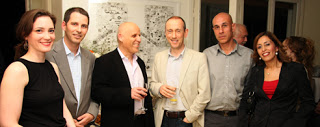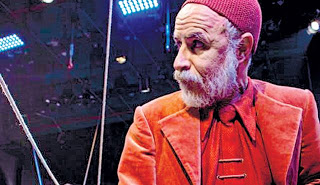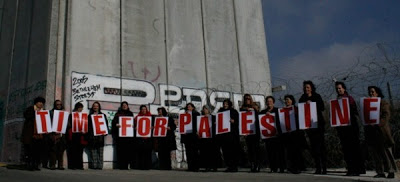Habima is Actively Complicit in the Occupation of the West Bank
 |
|
Odelia Friedman, Benny Tzarfati, Nicholas Hytner, Ilan Ronen, Jim Betri
and Julia Smith (the British Council) – not an Arab in sight
because this is an Israeli Jewish theatre group
|
One
of the more frequent lies perpetrated by those who support Apartheid is that ‘politics
and culture (sport,music) don’t mix.’ We
shouldn’t disturb the ‘beautiful music’ of whoever. This was the ritual cry of those who defended
Apartheid, like the BBC, which carried coverage of the Springbok cricketers to
the very end. But it still remains a
lie. Every repressive country and state
tries to show its ‘nicer’ cultural side.
Not for nothing were the Jerusalem Quartet designated cultural
ambassadors to the world.
of the more frequent lies perpetrated by those who support Apartheid is that ‘politics
and culture (sport,music) don’t mix.’ We
shouldn’t disturb the ‘beautiful music’ of whoever. This was the ritual cry of those who defended
Apartheid, like the BBC, which carried coverage of the Springbok cricketers to
the very end. But it still remains a
lie. Every repressive country and state
tries to show its ‘nicer’ cultural side.
Not for nothing were the Jerusalem Quartet designated cultural
ambassadors to the world.
I
have a simple question, which so far no Zionist has been able to answer.
have a simple question, which so far no Zionist has been able to answer.
Would it have been acceptable to protest and disrupt
concerts by Wilhelm Furtwangler, its conductor and the Berlin Philharmonic
Orchestra? They were funded by the Nazi
state and seen by Goebbels as an excellent way to win people to the Nazi cause.
 |
| Bethlehem as seen inside the checkpoint |
 |
|||
| Palestinian girl from Gaza plays cello – |
Yitzhak Laor,
Israel’s most famous poet, but a stern critic of Zionism, points out in Haaretz
of 31.7.08: that section 12 of the contract that all Israeli artists who
receive state sponsorship must sign, states that:
“The service provider undertakes to act faithfully, responsibly and
tirelessly to provide the Ministry with the highest professional services. The
service provider is aware that the purpose of ordering services from him is to
promote the policy interests of the State of Israel via culture and art, including
contributing to creating a positive image for Israel.”
So anyone picketing or asking the theatre
group a few questions should feel perfectly entitled to do so.
group a few questions should feel perfectly entitled to do so.
 |
| Habima’s Shylock – demanding a Palestinian pound of flesh |
A Call to Shakespeare’s
Globe Theatre
Globe Theatre
To:
The
directors
directors
World
Shakespeare Festival 2012
Shakespeare Festival 2012
c/o
Shakespeare’s Globe Theatre
Shakespeare’s Globe Theatre
21 New
Globe Walk
Globe Walk
Bankside
London
SE1 9DT
UK
Dear
Sir/Madam
Sir/Madam
Israel’s
Habima Theatre is due to present, in your forthcoming festival, “The
Merchant of Venice”. As noted on your website, this play includes the role
of “Shylock, the most famous and controversial Jewish character in the
theatre canon” – which naturally, presents particularly acute problems and
dilemmas to an Israeli theatre.
Habima Theatre is due to present, in your forthcoming festival, “The
Merchant of Venice”. As noted on your website, this play includes the role
of “Shylock, the most famous and controversial Jewish character in the
theatre canon” – which naturally, presents particularly acute problems and
dilemmas to an Israeli theatre.
As
told to the Israeli media, the Habima Theatre did not sidestep the problems
inherent to this particular element of the Shakespeare canon, but faced them
and dealt with them in a socially engaged and committed manner. According to
the designated director Ilan Ronen, Habima’s presentation of “The Merchant
of Venice” will emphasize the issue of xenophobia – persecution of the Jew
in particular but also of hatred of ethnic and religious minorities in general.
As such, it would have of direct relevance to audiences in contemporary
Britain, as in all times and places.
told to the Israeli media, the Habima Theatre did not sidestep the problems
inherent to this particular element of the Shakespeare canon, but faced them
and dealt with them in a socially engaged and committed manner. According to
the designated director Ilan Ronen, Habima’s presentation of “The Merchant
of Venice” will emphasize the issue of xenophobia – persecution of the Jew
in particular but also of hatred of ethnic and religious minorities in general.
As such, it would have of direct relevance to audiences in contemporary
Britain, as in all times and places.
It must
be said, however, that Habima’s praiseworthy outspoken position on this issue
seems at variance with its stance on another issue which is highly
controversial here in Israel – the creation and the expansion
of settlements in occupied Palestinian territory – a policy which has recently
impacted the sphere of Israeli Theatre in a very direct manner.
be said, however, that Habima’s praiseworthy outspoken position on this issue
seems at variance with its stance on another issue which is highly
controversial here in Israel – the creation and the expansion
of settlements in occupied Palestinian territory – a policy which has recently
impacted the sphere of Israeli Theatre in a very direct manner.
In the
past year, two large settlements – Ariel in the northern part of the West Bank
and Kiryat Arba in its south – set up “Halls of Culture” and asked
theatres to come and present their plays there. Last year, a large group of
Israeli theatre professionals – actors, stage directors, playwrights – declared
they would not take part in such performances; among them were such well-known
people as Joshua Sobol, Edna Mazia, Shmuel Hasfari and Anat Gov. For several
weeks, this was a major issue on the Israeli public agenda, and the
aforementioned Israeli theatre professionals have received much support from
colleagues abroad, such as Stephen Sondheim, Mary Rodgers, Tony Kushner, Mandy
Patinkin, Theodore Bikel, Mira Nair, Julianne Moore, Vanessa Redgrave, Hal
Prince, Roseanne Barr and other Broadway and Hollywood stars.
past year, two large settlements – Ariel in the northern part of the West Bank
and Kiryat Arba in its south – set up “Halls of Culture” and asked
theatres to come and present their plays there. Last year, a large group of
Israeli theatre professionals – actors, stage directors, playwrights – declared
they would not take part in such performances; among them were such well-known
people as Joshua Sobol, Edna Mazia, Shmuel Hasfari and Anat Gov. For several
weeks, this was a major issue on the Israeli public agenda, and the
aforementioned Israeli theatre professionals have received much support from
colleagues abroad, such as Stephen Sondheim, Mary Rodgers, Tony Kushner, Mandy
Patinkin, Theodore Bikel, Mira Nair, Julianne Moore, Vanessa Redgrave, Hal
Prince, Roseanne Barr and other Broadway and Hollywood stars.
The
dissident Israeli theatre professionals have argued that the West bank
settlements had been created in violation of International Law and with the
specific aim of blocking any possibility of achieving peace with the
Palestinians; that the expropriation of land in an occupied territory and
the creation and maintenance of armed settlement enclaves are the very opposite
of what is commonly termed “Culture”; and that therefore, a
settlement maintaining a “Hall of Culture” was a blatant
contradiction in terms.
dissident Israeli theatre professionals have argued that the West bank
settlements had been created in violation of International Law and with the
specific aim of blocking any possibility of achieving peace with the
Palestinians; that the expropriation of land in an occupied territory and
the creation and maintenance of armed settlement enclaves are the very opposite
of what is commonly termed “Culture”; and that therefore, a
settlement maintaining a “Hall of Culture” was a blatant
contradiction in terms.
It is
especially noteworthy that Ariel and Kiryat Arba, like most settlements, are
surrounded by walls and fences, closely guarded by soldiers and their own armed
security personnel. A theatrical performance in a settlement is by definition a
performance to an exclusively Israeli audience, with Palestinians living even
in the nearest village being physically excluded from any chance of attending.
especially noteworthy that Ariel and Kiryat Arba, like most settlements, are
surrounded by walls and fences, closely guarded by soldiers and their own armed
security personnel. A theatrical performance in a settlement is by definition a
performance to an exclusively Israeli audience, with Palestinians living even
in the nearest village being physically excluded from any chance of attending.
Despite
all of the above, however, on this issue the management of Habima has taken a
position which is remote from any kind of social engagement. Claiming to be
“non-political”, the management has reiterated its decision to
perform in West Bank settlements, “like everywhere else”. Moreover,
the management specifically promised Limor Livnat, Minister of Culture in the
Netanyahu Government, to “deal with any problems hindering such
performances”, i.e. to pressure recalcitrant actors into taking part in
them, even against the dictates of their conscience. And it must be
pointed out that for several months, Habima has indeed sent out its actors to
hold theatrical performances in West Bank settlements, on a regular basis.
all of the above, however, on this issue the management of Habima has taken a
position which is remote from any kind of social engagement. Claiming to be
“non-political”, the management has reiterated its decision to
perform in West Bank settlements, “like everywhere else”. Moreover,
the management specifically promised Limor Livnat, Minister of Culture in the
Netanyahu Government, to “deal with any problems hindering such
performances”, i.e. to pressure recalcitrant actors into taking part in
them, even against the dictates of their conscience. And it must be
pointed out that for several months, Habima has indeed sent out its actors to
hold theatrical performances in West Bank settlements, on a regular basis.
As
Israeli citizens who are deeply concerned about the future of all people living
in the region we deplore this attitude. We cannot help seeing the
positions taken by Habima Theatre on the two issues – presentation of “The
Merchant of Venice” in London and regular performances in West Bank
settlements – as inherently incompatible. By inviting Habima to perform
in London, you are siding with its administrators in the debate on settlement
performances, and you are taking a step against the conscientious Israeli
actors and playwrights who have refused to perform in the settlements.
Israeli citizens who are deeply concerned about the future of all people living
in the region we deplore this attitude. We cannot help seeing the
positions taken by Habima Theatre on the two issues – presentation of “The
Merchant of Venice” in London and regular performances in West Bank
settlements – as inherently incompatible. By inviting Habima to perform
in London, you are siding with its administrators in the debate on settlement
performances, and you are taking a step against the conscientious Israeli
actors and playwrights who have refused to perform in the settlements.
We would
be grateful to you for taking this issue up with your colleagues of Habima,
ahead of its scheduled performance in London on May 28-29, 2012.
be grateful to you for taking this issue up with your colleagues of Habima,
ahead of its scheduled performance in London on May 28-29, 2012.
Sincerely,
Boycott! Supporting the
Palestinian BDS Call from Within (Boycott from Within)
Palestinian BDS Call from Within (Boycott from Within)
See also:
Hath not an Israeli theater company eyes? Does it not bleed?
Pro-Palestinian activists, including A-list
actors, are calling for a boycott of Habima’s upcoming London production
of ‘The Merchant of Venice.’
See also Culture Ministry accuses Habima national theater of damaging Israel- Israel’s national theater fails to pay $160,000 in copyright fees for plays it purchased for translation.
Posted in Blog


